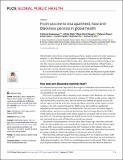| dc.contributor.author | Kyobutungi, Catherine | |
| dc.contributor.author | Gitahi, Githinji | |
| dc.contributor.author | Wangari, Marie-Claire | |
| dc.contributor.author | Siema, Patterson | |
| dc.contributor.author | Gitau, Evelyn | |
| dc.contributor.author | Sipalla, Florence | |
| dc.contributor.author | Pai, Madhukar | |
| dc.contributor.author | Oti, Samuel Oji | |
| dc.contributor.editor | Robinson, Julia | |
| dc.date.accessioned | 2023-07-21T21:40:15Z | |
| dc.date.available | 2023-07-21T21:40:15Z | |
| dc.date.issued | 2023-02-27 | |
| dc.identifier.citation | Kyobutungi C, Gitahi G, Wangari M-C, Siema P, Gitau E, Sipalla F, et al. (2023) From vaccine to visa apartheid, how anti-Blackness persists in global health. PLOS Glob Public Health 3(2): e0001663. https://doi.org/10.1371/journal. pgph.0001663 | en_US |
| dc.identifier.uri | https://repository.amref.ac.ke/handle/20.500.14173/849 | |
| dc.description.abstract | Global health evolved from colonial medicine and hence deeply rooted in the white supremacy mindset. Anti-Blackness is an inescapable consequence. Definitions of anti-Blackness revolve around the positioning of Black people, their cultural practices and knowledge as inferior, the conscious and unconscious dehumanization and discrimination of Black bodies, a disdain for Black people and their lived experiences, the disenfranchisement of Black people, but above all, a system of beliefs and practices that erode their humanity. | en_US |
| dc.publisher | PubMed | en_US |
| dc.title | From Vaccine to Visa Apartheid, How AntiBlackness Persists in Global Health. | en_US |
| dc.type | Article, Journal | en_US |

